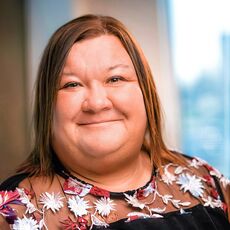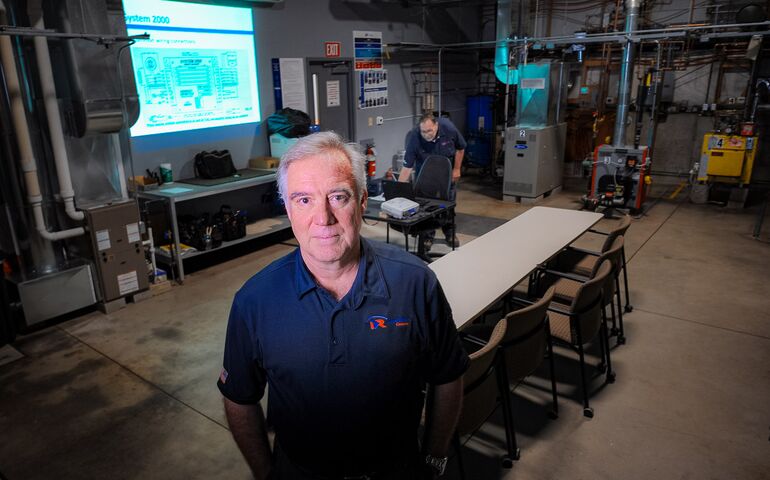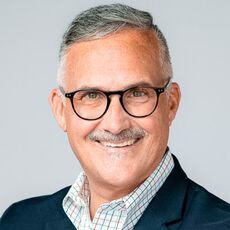
Companies and higher ed increasingly join forces on employee education programs
 Photo / Fred Field
Dan Carrigan, director of organization development and learning for Dead River Co. in South Portland, says workforce education partnerships with higher education organizations have been an important retention tool.
Photo / Fred Field
Dan Carrigan, director of organization development and learning for Dead River Co. in South Portland, says workforce education partnerships with higher education organizations have been an important retention tool.
Ten new technicians recently graduated from a grant-funded training program offered at Dead River Institute-North, a workforce training facility in Bangor developed through a partnership between South Portland-based heating services provider Dead River Co. and Eastern Maine Community College.
Graduates of DRI-North and its associated facility, DRI-South in Sanford, are all working now.
“We’ve retained them all — knock on wood,” says Dead River’s director of organization development and learning, Dan Carrigan. “That’s another real plus to this approach. We find it’s really important to get them in the field and make sure they have a good experience and are feeling good about what they do.”
Dead River is looking to develop other higher ed partnerships, including commercial driver license programs. At its locations outside of Maine, the company is looking to see if it can duplicate its Maine model.
From the higher ed side, the development of partnerships with businesses involves a lot of discussion around identifying gaps between businesses, job-seekers and students, says Susan Cerini, Eastern Maine Community College’s dean of workforce and professional solutions.

“Dead River was just one example,” Cerini says. “We have many examples. It could be leadership training, or talking with businesses to evaluate the issues they have in retaining and attracting employees. On the other side, I’m able to share with them what we hear from students and job-seekers in the community to see if we can bridge that gap.”
Growing trend
The Dead River institutes are part of a growing trend of partnerships developed between employers and higher education. This is happening on fronts ranging from entry-level, pre-hire training to professional development opportunities.
The concept, says Mikaela Ziobro at Thomas College in Waterville, has roots in other statewide initiatives such as MaineSpark, a coalition of education and business organizations connecting people with education, training, jobs, programs and resources.

In the past two years, Thomas College has been developing its own outreach to offer employers selected online graduate programs with the first class free and additional courses at a 10% discount, plus additional certifications on top of what employees are getting in the classroom.
“The beauty of this is that our programs are 100% online, so companies are able to offer this benefit to anyone anywhere in their system,” says Ziobro, who is Thomas College’s senior director of graduate and professional studies.
Hands-on training
In 2018, Dead River launched its first training facility, Dead River Institute-South, in Sanford. The impetus was a statewide and national shortage of trained applicants due to historically low unemployment.
In 2021, the company partnered with Southern Maine Community College to offer classes to employees three days a week at the college campus, with two days per week at Dead River’s Sanford facility to do hands-on training on heating equipment, says Carrigan.
That developed into a 200-hour oil burner technician class offered entirely at the Sanford facility using Dead River trainers while using the college’s approved curriculum. The partnership allows Dead River to offer an accelerated program that leads directly to a paid apprenticeship and also acquaints students with the company culture.
DRI-North was designed to build on the model, offering training at no cost to students thanks to a grant from the Harold Alfond Center for the Advancement of Maine’s Workforce. F.W. Webb Co. and the Granite Group contributed roughly $30,000 of heating equipment to the facility.
The first class had 10 students. Graduates can immediately leverage the training and credentials to enhance their careers or serve as an entry point if they are just entering the workforce.
“The advantage for the students is that, within two months, they can be out with a full-time job and some good career opportunities,” says Carrigan. “It’s really a positive.”
High demand
The partnerships come at time when businesses are struggling to fill openings, says EMCC's Cerini.
“Our role is to facilitate those conversations, so everyone on both sides can figure out how to meet demand.”
That could be as simple as short-term trainings leading directly to the workplace, or professional development to upskill incumbent employees.
EMCC recently completed a leadership course with Hamilton Marine, a marine supply store with locations along the coast.
“We were able to customize the training,” Cerini says. “We want to support professional development but it can be hard for the employer to find the time. So we customized the training based on the time of year. We offered it one day a week, every other week, for two to three hours. We scheduled it at a time that was best for them. And it was hybrid,” so that, even though the training was in-person in one location, employees at others could participate.
Doubling income
The Harold Alfond Center for the Advancement of Maine’s Workforce, under the Maine Community College System, oversees a $62 million investment in Maine’s workforce and supports its business partners in three areas, says Chief Workforce Development Officer Dan Belyea.
- Entry level training programs, similar to Dead River’s, have enrolled 2,579 participants to date.
- Training programs for incumbent employees have enrolled 8,701.
- Course scholarships have 956 takers so far.
The entry-level programs are funded through the Maine Jobs and Recovery Plan. The incumbent training and scholarships are funded by the Harold Alfond Foundation. Employers are invited to join the Maine Workforce Development Compact, a simple agreement between MCCS and organizations that allows compact members streamlined access to Alfond Center services. That includes financial matches for frontline workers, community college scholarships, advisors and maintenance of training records. The Alfond Center aims to serve 24,000 Mainers with short-term training by 2025.

Training for compact members can occur at Maine’s community colleges, by a third-party training vendor, or through company-based training.
Created in late 2021, the compact began with 90 members and today has about 1,170, representing 270,000, or half, of Maine’s frontline workers.
“What we’re hearing is that it’s helping with retention, it’s helping upskill workers so they’re ready for promotions and helping ease the gap with the number of retirees who are leaving,” Belyea says.
One student, formerly in food service, recently graduated from a commercial driver’s license program and was hired within hours. Another, who worked nights in a convenience store, took a dental assisting program, found a position she loved and doubled her income.
“We’re hearing those stories all the time,” says Belyea.
An added benefit
Thomas College has 14 business partnerships across Maine, providing free or discounted educational opportunities to employees. That includes providing graduate courses and certificate for advanced study to foster career development, along with working with employers to develop talent pipelines for undergraduates through internships. About 40 students took 40 courses last year. Eleven were fully matriculated into degree programs and l6 finished their degrees.
Delivered in eight-week modules, employees can pursue the programs at their own pace. “It is a model that’s working,” Ziobro says.
Outcomes? “It’s a retention driver for employers because they’re offering employees an added benefit,” says Ziobro. “And they’re saying, ‘This is important and if you do this you have an opportunity to advance within the organization.’”
One of Thomas College’s partners is the Maine Municipal Association.
“One of the services that we provide is training and education for our members, and that includes working with partners such as colleges and universities to provide and facilitate educational opportunities,” says Peter Osborne, the association’s director of education.

He continues, “When Thomas approached us about a preferred education partnership for MMA and our members, it seemed to present an excellent opportunity for our members to access quality graduate education opportunities at a discounted cost. Additionally, we knew that Thomas’s flexible online programs would be a great fit for many of the working professionals in Maine’s towns and cities who may be looking to continue their education.”
New career
One of those member employees is Gregory McCarthy, an officer with the Brunswick Police Department, currently assigned as a school resource officer. McCarthy took up the opportunity to study for a master’s degree in criminology through Thomas College, with the first class free followed by tuition discounts.

“I’ve been in law enforcement about 11 years now,” McCarthy says. “Having a master’s will elevate me and give me an edge to get a better job once I retire from my current career in law enforcement.”
McCarthy is doing two classes at a time and likes the flexibility of going at his own pace.
“It’s been a while since I’ve been in school, so getting used to the course load again is tough,” he says.
The goal? “I want to be a detective — that’s been my goal for a long time,” he says. “I think having this degree will put me in a good position to be prepared to do that job.”
Local partners
Husson University this year launched the College of Business’s Institute for Strategic Leadership and Workforce Development.
“We’re already working with our local partners,” says Michael Camire, an assistant professor and program coordinator.
The catalyst? “Folks reached out to us,” says Camire. “There’s been a large desire to upskill the workforce in general, especially since the pandemic. Based on what each organization’s needs are, we work with them to tailor a program to help support their leadership and business goals.”

Customized solutions include training courses, seminars, tailored presentations and targeted focus sessions, on topics ranging from strategic change management and planning to new business trends and leadership development.
L.L.Bean tested a partnership with Husson as a pilot before the pandemic, when the company was looking for ways to support employees’ advanced educational needs.
“We were looking for a solid MBA program with online options as well as the option to meet in person as a cohort,” says Joe Surace, L.L.Bean’s manager of corporate learning and development. “Husson had demonstrated experience with other partners that set them apart.”
To date, L.L.Bean has sponsored two cohorts, totaling 21 participants, offering an accelerated MBA with a deferred billing option. Ten students received MBAs and 11 are in year two.
Ahead of the curve
Some view Maine as being ahead of the curve on the pursuit of partnerships between the business and higher ed communities.
“I think Maine is a model because of the way we leverage our community partners, our resources and our funding,” says Cerini.
Says Belyea, “We have a solution. We don’t have the solution. All of us together are doing really cool things. And when we partner and collaborate, that’s where the magic happens.”














0 Comments